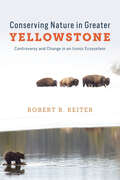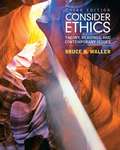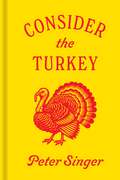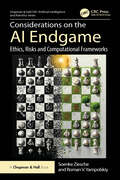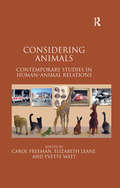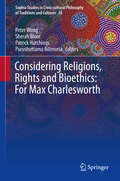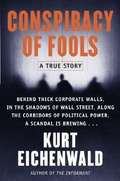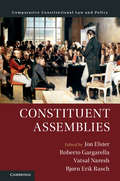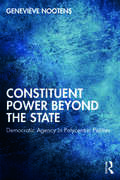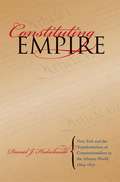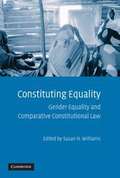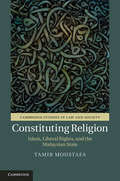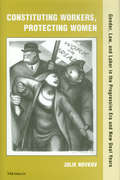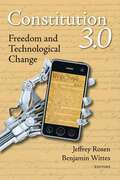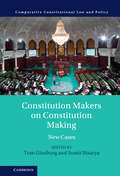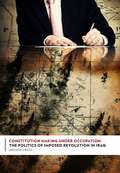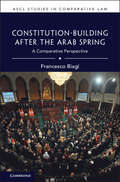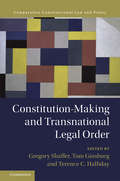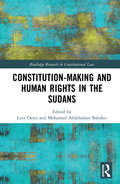- Table View
- List View
Conserving Nature in Greater Yellowstone: Controversy and Change in an Iconic Ecosystem
by Robert B. KeiterThe story of how Yellowstone, established in 1872 as the world’s first national park, has become synonymous with nature conservation—and an examination of today’s challenges to preserve the region’s wilderness heritage. For more than 150 years, the Yellowstone region—now widely known as the twenty-three million acre Greater Yellowstone Ecosystem—has played a prominent role in the United States’ nature conservation agenda. In this book, Robert B. Keiter, an award-winning public land law and policy expert, traces the evolution and application of fundamental ecological conservation concepts tied to Yellowstone. Keiter’s book highlights both the conservation successes and controversies connected with this storied region, which has been enmeshed in change. During the 1980s, leaders in Yellowstone embraced ecosystem management concepts to recover a dwindling grizzly bear population and to support wolf reintroduction. Since then, management policies in the region’s two national parks and adjacent national forests have largely followed suit, prioritizing ecosystem-level conservation over industrial activity. Groundbreaking efforts are currently afoot to protect elk, deer, and pronghorn migration corridors and to maintain the park’s bison population, effectively expanding the scope of regional conservation initiatives. But in the face of explosive human population growth and related development pressures, new efforts must also account for the region’s privately owned lands along with accelerating recreational activities that present quite different problems. Indeed, the Greater Yellowstone Ecosystem—extending across three states and twenty counties and embracing more than sixteen million acres of federal land as well as private and tribal lands —can only be characterized as a complex, jurisdictionally fragmented landscape. As Keiter makes clear, the quest for common ground among federal land managers, state officials, local communities, conservationists, ranchers, Indigenous tribes, and others is a vital, enduring task. Exploring both notable conservation accomplishments and the ongoing challenges confronting this special place, Keiter’s book explains the many forces—scientific, political, economic, legal, cultural, climatic, and more—at work driving controversy and change across the region. But more than this, Conserving Nature in Greater Yellowstone shows us that the lessons gleaned from Yellowstone’s expansive nature conservation efforts are profoundly important for both the country and the world.
Consider Ethics: Theory, Readings, and Contemporary Issues
by Bruce N. WallerOffering a balance of theory and applications and a mix of text and readings, Consider Ethics begins with chapters covering ethical theory, each of which is followed by related, classical readings. The book concludes with an examination of six contemporary ethical issues presented in a pro/con format with introductory material that places each issue in context. Featuring selections from the world's most influential philosophers, this combination of primary texts and explanatory pedagogy presents the material in a clear, accessible way that does not sacrifice rigor. Making connections among different ethical theories throughout, the text helps students to engage the subject matter and apply theories to important contemporary ethical issues.
Consider the Turkey
by Peter SingerWhy this holiday season is a great time to rethink the traditional turkey feastA turkey is the centerpiece of countless Thanksgiving and Christmas dinners. Yet most of us know almost nothing about today&’s specially bred, commercially produced birds. In this brief book, bestselling author Peter Singer tells their story—and, unfortunately, it&’s not a happy one. Along the way, he also offers a brief history of the turkey and its consumption, ridicules the annual U.S. presidential &“pardon&” of a Thanksgiving turkey, and introduces us to &“a tremendously handsome, outgoing, and intelligent turkey&” named Cornelius. Above all, Singer explains how we can improve our holiday tables—for turkeys, people, and the planet—by liberating ourselves from the traditional turkey feast. In its place, he encourages us to consider trying a vegetarian alternative—or just serving the side dishes that many people already enjoy far more than turkey. Complete with some delicious recipes for turkey-free holiday feasting, Consider the Turkey will make you reconsider what you serve for your next holiday meal—or even tomorrow&’s dinner.
Considerations on the AI Endgame: Ethics, Risks and Computational Frameworks (Chapman & Hall/CRC Artificial Intelligence and Robotics Series)
by Soenke Ziesche Roman V. YampolskiyThis seminal volume offers an interdisciplinary exploration into the rapidly evolving field of artificial intelligence and its societal implications. Written by leading scholars Soenke Ziesche and Roman V. Yampolskiy, the book delves into a multitude of topics that address the rapid technological advancements in AI and the ethical dilemmas that arise as a result.The topics explored range from an in-depth look at AI welfare science and policy frameworks to the mathematical underpinnings of machine intelligence. These subjects include discussions on preserving our personal identity in technological contexts as well as on the question of AI identity, innovative proposals towards the critical AI value alignment problem and a call to merge Western and non-Western approaches towards universal AI ethics. The work also introduces unconventional yet crucial angles, such as the concept of "ikigai" in AI ethics and a pioneering attempt to map a potential AI-driven ikigai universe as well as the role of design formalisation, or "Designometry," in the creation of artefacts.By offering a balanced mix of theoretical and applied insights, the book serves as an invaluable resource for researchers, policymakers and anyone interested in the future of AI and the extent of its impact on society.
Considering Animals: Contemporary Studies in Human–Animal Relations
by Elizabeth Leane Carol Freeman Yvette WattConsidering Animals draws on the expertise of scholars trained in the biological sciences, humanities, and social sciences to investigate the complex and contradictory relationships humans have with nonhuman animals. Taking their cue from the specific 'animal moments' that punctuate these interactions, the essays engage with contemporary issues and debates central to human-animal studies: the representation of animals, the practical and ethical issues inseparable from human interactions with other species, and, perhaps most challengingly, the compelling evidence that animals are themselves considering beings. Case studies focus on issues such as animal emotion and human 'sentimentality'; the representation of animals in contemporary art and in recent films such as March of the Penguins, Happy Feet, and Grizzly Man; animals' experiences in catastrophic events such as Hurricane Katrina and the SARS outbreak; and the danger of overvaluing the role humans play in the earth's ecosystems. From Marc Bekoff's moving preface through to the last essay, Considering Animals foregrounds the frequent, sometimes uncanny, exchanges with other species that disturb our self-contained existences and bring into focus our troubled relationships with them. Written in an accessible and jargon-free style, this collection demonstrates that, in the face of species extinction and environmental destruction, the roles and fates of animals are too important to be left to any one academic discipline.
Considering Marijuana Legalization: Insights for Vermont and Other Jurisdictions
by Mark A. R. Kleiman Peter H. Reuter Robert J. Maccoun Beau Kilmer Rosalie Liccardo Pacula Jonathan P. Caulkins Gregory Midgette Pat OglesbyAnalysis
Considering Religions, Rights and Bioethics: Memorial Volume For Max Charlesworth (Sophia Studies in Cross-cultural Philosophy of Traditions and Cultures #30)
by Peter Wong Purushottama Bilimoria Sherah Bloor Patrick HutchingsThis volume engages in conversation with the thinking and work of Max Charlesworth as well as the many questions, tasks and challenges in academic and public life that he posed. It addresses philosophical, religious and cultural issues, ranging from bioethics to Australian Songlines, and from consultation in a liberal society to intentionality. The volume honours Max Charlesworth, a renowned and celebrated Australian public intellectual, who founded the journal Sophia, and trained a number of the present heirs to both Sophia and academic disciplines as they were further developed and enhanced in Australia: Indigenous Australian studies, philosophy of religion, the study of the tension between tradition and modernity, phenomenology and existentialism, hermeneutics, feminist philosophy, and philosophy of science that is responsive to environmental issues.
Constituent Assemblies (Comparative Constitutional Law And Policy Ser.)
by Roberto Gargarella Jon Elster Vatsal Naresh Bjørn Erik RaschComparative constitutional law has a long pedigree, but the comparative study of constitution-making has emerged and taken form only in the last quarter-century. While much of the initial impetus came from the study of the American and French constituent assemblies in the late eighteenth century, this volume exemplifies the large comparative scope of current research. The contributors discuss constituent assemblies in South East Asia, North Africa and the Middle East, Latin America, and in Nordic countries. Among the new insights they provide is a better understanding of how constituent assemblies may fail, either by not producing a document at all or by adopting a constitution that fails to serve as a neutral framework for ordinary politics. In a theoretical afterword, Jon Elster, an inspirational thinker on the current topic, offers an analysis of the micro-foundations of constitution-making, with special emphasis on the role of crises-generated passions.
Constituent Power Beyond the State: Democratic Agency in Polycentric Polities
by Geneviève NootensThe concept of constituent power plays a major part in modern political and legal theory— in how we think about the political. This book tackles the twofold issue of public authority and public autonomy in the modern conception of the political by analysing the notion of constituent power, its function in the modern political apparatus, and debates about its meaning and function in our own context. Focusing on contemporary debates on constitutionalism "beyond" the state, Geneviève Nootens assesses the prospects for recasting the notion of constituent power in a polycentric setting that challenges state sovereignty as embodying the autonomy of the political. She argues that constituent power belongs with the conceptual apparatus of a theory of government peculiar to a statist way of knowing, and being into, the world, and that it is too much dependent upon the statist framework for it to have critical purchase on the new mappings of public authority. Nootens stresses the critical need to frame public authority appropriately if we are to conceptualize a conception of collective political agency that can sustain public autonomy in the current era. Constituent Power Beyond the State will be of interest to students and scholars of political theory, democratic theory, law, and constitutionalism.
Constituting Empire
by Daniel J. HulseboschAccording to the traditional understanding of American constitutional law, the Revolution produced a new conception of the constitution as a set of restrictions on the power of the state rather than a mere description of governmental roles. Daniel J. Hulsebosch complicates this viewpoint by arguing that American ideas of constitutions were based on British ones and that, in New York, those ideas evolved over the long eighteenth century as New York moved from the periphery of the British Atlantic empire to the center of a new continental empire. Hulsebosch explains how colonists and administrators reconfigured British legal sources to suit their needs in an expanding empire. In this story, familiar characters such as Alexander Hamilton and James Kent appear in a new light as among the nation's most important framers, and forgotten loyalists such as Superintendent of Indian Affairs Sir William Johnson and lawyer William Smith Jr. are rightly returned to places of prominence.In his paradigm-shifting analysis, Hulsebosch captures the essential paradox at the heart of American constitutional history: the Revolution, which brought political independence and substituted the people for the British crown as the source of legitimate authority, also led to the establishment of a newly powerful constitution and a new postcolonial genre of constitutional law that would have been the envy of the British imperial agents who had struggled to govern the colonies before the Revolution.In his paradigm-shifting analysis, Daniel J. Hulsebosch captures the essential paradox at the heart of American constitutional history: the Revolution, which brought political independence and substituted the people for the British crown as the source of legitimate authority, also led to the establishment of newly powerful constitutions and a new postcolonial genre of constitutional law that would have been the envy of the British imperial agents who had struggled to govern the colonies before the Revolution.The revolutionary transformation did not, therefore, consist of a new conception of the constitution as a set of restrictions on the power of the state, Hulsebosch argues. Instead, it entailed a search for new ways of framing, empowering, and limiting official power. Drawing on new archival sources as well as canonical documents such as The Federalist Papers, Hulsebosch demonstrates that these constitutional experiments were informed by imperial experience and continued well into the nineteenth century, as New York moved from the periphery of the British Atlantic empire to the center of a new continental empire.-->
Constituting Equality: Gender Equality and Comparative Constitutional Law
by Susan H. WilliamsConstituting Equality addresses the question, how would you write a constitution if you really cared about gender equality? The book takes a design-oriented approach to the broad range of issues that arise in constitutional drafting concerning gender equality. Each section of the book examines a particular set of constitutional issues or doctrines across a range of different countries to explore what works, where, and why. Topics include (1) governmental structure (particularly electoral gender quotas); (2) rights provisions; (3) constitutional recognition for cultural or religious practices that discriminate against women; (4) domestic incorporation of international law; and (5) the role of women in the process of constitution-making. Interdisciplinary in orientation and global in scope, the book provides a menu for constitutional designers and others interested in how the fundamental legal order might more effectively promote gender equality.
Constituting Religion: Islam, Liberal Rights, and the Malaysian State (Cambridge Studies in Law and Society)
by Tamir MoustafaMost Muslim-majority countries have legal systems that enshrine both Islam and liberal rights. While not necessarily at odds, these dual commitments nonetheless provide legal and symbolic resources for activists to advance contending visions for their states and societies. Using the case study of Malaysia, Constituting Religion examines how these legal arrangements enable litigation and feed the construction of a 'rights-versus-rites binary' in law, politics, and the popular imagination. By drawing on extensive primary source material and tracing controversial cases from the court of law to the court of public opinion, this study theorizes the 'judicialization of religion' and the radiating effects of courts on popular legal and religious consciousness. The book documents how legal institutions catalyze ideological struggles, which stand to redefine the nation and its politics. Probing the links between legal pluralism, social movements, secularism, and political Islamism, Constituting Religion sheds new light on the confluence of law, religion, politics, and society. This title is also available as Open Access.
Constituting Workers, Protecting Women: Gender, Law, and Labor in the Progressive Era and New Deal Years
by Julie NovkovConstitutional considerations of protective laws for women were the analytical battlefield on which the legal community reworked the balance between private liberty and the state's authority to regulate. Julie Novkov focuses on the importance of gender as an analytical category for the legal system. During the Progressive Era and New Deal, courts often invalidated generalized protective legislation, but frequently upheld measures that limited women's terms and conditions of labor. The book explores the reasoning in such cases that were decided between 1873 and 1937. By analyzing all reported opinion on the state and federal level, as well as materials from the women's movement and briefs filed in the U.S. Supreme Court, the study demonstrates that considerations of cases involving women's measures ultimately came to drive the development of doctrine. The study combines historical institutionalism and feminism to address constitutional interpretation, showing that an analysis of conflict over the meaning of legal categories provides a deeper understanding of constitutional development. In doing so, it rejects purely political interpretations of the so-called Lochner era, in which the courts invalidated many legislative efforts to ameliorate the worst effects of capitalism. By addressing the dynamic interactions among interested laypersons, attorneys, and judges, it demonstrates that no individuals or institutions have complete control over the generation of constitutional meaning.
Constitution 3.0
by Benjamin Wittes Jeffrey RosenAt the beginning of the twenty-first century, breathtaking changes in technology are posing stark challenges to our constitutional values. From free speech to privacy, from liberty and personal autonomy to the right against self-incrimination, basic constitutional principles are under stress from technological advances unimaginable even a few decades ago, let alone during the founding era. In this provocative collection, America's leading scholars of technology, law, and ethics imagine how to translate and preserve constitutional and legal values at a time of dizzying technological change. Constitution 3.0 explores some of the most urgent constitutional questions of the near future. Will privacy become obsolete, for example, in a world where ubiquitous surveillance is becoming the norm? Imagine that Facebook and Google post live feeds from public and private surveillance cameras, allowing 24/7 tracking of any citizen in the world. How can we protect free speech now that Facebook and Google have more power than any king, president, or Supreme Court justice to decide who can speak and who can be heard? How will advanced brain-scan technology affect the constitutional right against self-incrimination? And on a more elemental level, should people have the right to manipulate their genes and design their own babies? Should we be allowed to patent new forms of life that seem virtually human? The constitutional challenges posed by technological progress are wide-ranging, with potential impacts on nearly every aspect of life in America and around the world.The authors include Jamie Boyle, Duke Law School; Eric Cohen and Robert George, Princeton University; Jack Goldsmith, Harvard Law School; Orin Kerr, George Washington University Law School; Lawrence Lessig, Harvard Law School; Stephen Morse, University of Pennsylvania Law School; John Robertson, University of Texas Law School; Christopher Slobogin, Vanderbilt Law School; O. Carter Snead, Notre Dame Law School; Jeffrey Rosen, George Washington University Law School; Benjamin Wittes, Brookings Institution; Tim Wu, Columbia Law School; and Jonathan Zittrain, Harvard Law School.
Constitution 3.0
by Benjamin Wittes Jeffrey RosenAt the beginning of the twenty-first century, breathtaking changes in technology are posing stark challenges to our constitutional values. From free speech to privacy, from liberty and personal autonomy to the right against self-incrimination, basic constitutional principles are under stress from technological advances unimaginable even a few decades ago, let alone during the founding era. In this provocative collection, America's leading scholars of technology, law, and ethics imagine how to translate and preserve constitutional and legal values at a time of dizzying technological change. Constitution 3.0 explores some of the most urgent constitutional questions of the near future. Will privacy become obsolete, for example, in a world where ubiquitous surveillance is becoming the norm? Imagine that Facebook and Google post live feeds from public and private surveillance cameras, allowing 24/7 tracking of any citizen in the world. How can we protect free speech now that Facebook and Google have more power than any king, president, or Supreme Court justice to decide who can speak and who can be heard? How will advanced brain-scan technology affect the constitutional right against self-incrimination? And on a more elemental level, should people have the right to manipulate their genes and design their own babies? Should we be allowed to patent new forms of life that seem virtually human? The constitutional challenges posed by technological progress are wide-ranging, with potential impacts on nearly every aspect of life in America and around the world.The authors include Jamie Boyle, Duke Law School; Eric Cohen and Robert George, Princeton University; Jack Goldsmith, Harvard Law School; Orin Kerr, George Washington University Law School; Lawrence Lessig, Harvard Law School; Stephen Morse, University of Pennsylvania Law School; John Robertson, University of Texas Law School; Christopher Slobogin, Vanderbilt Law School; O. Carter Snead, Notre Dame Law School; Jeffrey Rosen, George Washington University Law School; Benjamin Wittes, Brookings Institution; Tim Wu, Columbia Law School; and Jonathan Zittrain, Harvard Law School.
Constitution Makers on Constitution Making: New Cases (Comparative Constitutional Law and Policy)
by Tom Ginsburg Sumit BisaryaConstitution-making is a major event in the life of a country, with constitutions often acting as a catalyst for social and political transformation. But what determines the visions, aspirations and compromises that go into a written constitution? In this unique volume, constitution makers from countries around the world come together to offer their insights. Using a collection of case studies from countries with recently written constitutions, Constitution Makers on Constitution Making provides a common framework to explain how constitutions are created. Scholars and practitioners very close to the process illuminate critical insights into how participants see constitutional options, how deadlocks are broken, and how changes are achieved. This vital volume also draws lessons concerning the role of courts in policing the process, on international involvement, and on public participation.
Constitution Making Under Occupation: The Politics of Imposed Revolution in Iraq
by Andrew AratoThe attempt in 2004 to draft an interim constitution in Iraq and the effort to enact a permanent one in 2005 were unintended outcomes of the American occupation, which first sought to impose a constitution by its agents. Andrew Arato is the first person to record this historic process and analyze its special problems. He compares the drafting of the Iraqi constitution to similar, externally imposed constitutional revolutions by the United States, especially in Japan and Germany, and identifies the political missteps that contributed to problems of learning and legitimacy.
Constitution Making Under Occupation: The Politics of Imposed Revolution in Iraq (Columbia Studies in Political Thought / Political History)
by Andrew AratoThe attempt in 2004 to draft an interim constitution in Iraq and the effort to enact a permanent one in 2005 were unintended outcomes of the American occupation, which first sought to impose a constitution by its agents. This two-stage constitution-making paradigm, implemented in a wholly unplanned move by the Iraqis and their American sponsors, formed a kind of compromise between the populist-democratic project of Shi'ite clerics and America's external interference. As long as it was used in a coherent and legitimate way, the method held promise. Unfortunately, the logic of external imposition and political exclusion compromised the negotiations. Andrew Arato is the first person to record this historic process and analyze its special problems. He compares the drafting of the Iraqi constitution to similar, externally imposed constitutional revolutions by the United States, especially in Japan and Germany, and identifies the political missteps that contributed to problems of learning and legitimacy. Instead of claiming that the right model of constitution making would have maintained stability in Iraq, Arato focuses on the fragile opportunity for democratization that was strengthened only slightly by the methods used to draft a constitution. Arato contends that this event would have benefited greatly from an overall framework of internationalization, and he argues that a better set of guidelines (rather than the obsolete Hague and Geneva regulations) should be followed in the future. With access to an extensive body of literature, Arato highlights the difficulty of exporting democracy to a country that opposes all such foreign designs and fundamentally disagrees on matters of political identity.
Constitution Making during State Building
by Joanne WallisHow can fragmented, divided societies that are not immediately compatible with centralised statehood best adjust to state structures? This book employs both comparative constitutional law and comparative politics, as it proposes the idea of a 'constituent process', whereby public participation in constitution making plays a positive role in state building. This can help to foster a sense of political community and produce a constitution that enhances the legitimacy and effectiveness of state institutions because a liberal-local hybrid can emerge to balance international liberal practices with local customary ones. This book represents a sustained attempt to examine the role that public participation has played during state building and the consequences it has had for the performance of the state. It is also the first attempt to conduct a detailed empirical study of the role played by the liberal-local-hybrid approach in state building.
Constitution Writing, Religion and Democracy
by Hanna Lerner Bâli Aslı Ü.What role do and should constitutions play in mitigating intense disagreements over the religious character of a state? And what kind of constitutional solutions might reconcile democracy with the type of religious demands raised in contemporary democratising or democratic states? Tensions over religion-state relations are gaining increasing salience in constitution writing and rewriting around the world. This book explores the challenge of crafting a democratic constitution under conditions of deep disagreement over a state's religious or secular identity. It draws on a broad range of relevant case studies of past and current constitutional debates in Europe, Asia, Africa and the Middle East, and offers valuable lessons for societies soon to embark on constitution drafting or amendment processes where religion is an issue of contention.
Constitution-Building After the Arab Spring: A Comparative Perspective (ASCL Studies in Comparative Law)
by Francesco BiagiHow were post-Arab Spring constitutions drafted? What are the most significant elements of continuity and change within the new constitutional texts? What purposes are these texts designed to serve? To what extent have constitutional provisions been enforced? Have the principles of constitutionalism been strengthened compared to the past? These are some of the key questions Francesco Biagi addresses. Constitution Building After the Arab Spring. A Comparative Perspective examines seven national experiences of constitution building in the Arab world following the 2011 uprisings, namely those of Morocco, Algeria, Tunisia, Libya, Egypt, Syria, and Jordan. This interdisciplinary book, based largely on the author's own work and research in the region, compares these seven national experiences through four analytical frameworks: constitution-drafting and constitutional reform processes; separation of powers and forms of government; constitutional justice; and religion, women and non-Muslims within the framework of citizenship.
Constitution-Making and Transnational Legal Order (Comparative Constitutional Law and Policy)
by Tom Ginsburg Terence C. Halliday Gregory ShafferSince the rise of the nation-state in the nineteenth century, constitutions have been seen as an embodiment of national values and identity. However, individuals, ideas, and institutions from abroad have always influenced constitutions, and so the process is better described as transnational. As cross-border interaction is increasing in intensity, a dominant transnational legal order for constitutions has emerged, with its own norms, guidelines and shared ideas. Yet both the process and substance of constitution-making are being contested in divergent and insurgent constitutional orders. Bringing together leading scholars from the United States, Europe, Latin America, and Asia, this volume addresses the actors, networks, norms and processes involved in constitution-making, as well as the related challenges, from a transnational and comparative perspective. Drawing from the research on transnational legal orders, this work explores and examines constitution-making in every region of the world.
Constitution-Making in the Region of Former Soviet Dominance
by Rett R. LudwikowskiWith the end of the Cold War and the disintegration of the Soviet Union, newly formed governments throughout Eastern Europe and the former Soviet states have created constitutions that provide legal frameworks for the transition to free markets and democracy. In Constitution-Making in the Region of Former Soviet Dominance, Rett R. Ludwikowski offers a comparative study of constitution-making in progress and provides insight into the complex political and social circumstances that are shaping its present and future. The first study of these recent constitutional developments, this book also provides an appendix of all newly ratified constitutions in the region, an essential new reference source for scholars, students, and professionals.Beginning with a review of the constitutional traditions of Eastern and Central Europe, Ludwikowski goes on to offer analysis of the recent process of political change in the region. A second section focuses specifically on the the new constitutions and such issues as the selection of the form of government, concepts of divisions of power, unicameralism vs. bicameralism, the flexibility or rigidity of constitutions as working documents, and the process of reviewing the constitutionality of laws. Individual states as framed in these documents are analyzed in economic, political, and cultural terms. Although it is too soon to fully consider the implementation of these constitutions, special attention is devoted to the effect of reform on human rights protection, a notorious problem of continuing concern in the region. A final section offers an insightful comparative study of constitutional law by reviewing the post-Soviet process of constitution-making against the backdrop of Western constitutional traditions.Constitution-Making in the Region of Former Soviet Dominance is both a comprehensive study of constitutional developments in the former Soviet bloc and a primary reference tool for scholars of constitutional law, and Eastern European and post-Soviet studies.
Constitution-making and Human Rights in the Sudans (Routledge Research in Constitutional Law)
by Lutz Oette Mohamed Abdelsalam BabikerSudan and South Sudan have suffered from repeated cycles of conflict and authoritarianism resulting in serious human rights and humanitarian law violations. Several efforts, such as the 2005 Comprehensive Peace Agreement and transitional justice initiatives have recognized that the failure to develop a stable political and legal order is at the heart of Sudan’s governance problems. Following South Sudan’s independence in 2011, parallel constitutional review processes are under way that have prompted intense debates about core issues of Sudan’s identity, governance and rule of law, human rights protection and the relationship between religion and the State. This book provides an in-depth study of Sudan’s constitutional history and current debates with a view to identifying critical factors that would enable Sudan and South Sudan to overcome the apparent failure to agree on and implement a stable order conducive to sustainable peace and human rights protection. It examines relevant processes against the broader (constitutional) history of Sudan and identifies the building blocks for constitutional reforms through a detailed analysis of Sudanese law and politics. The book addresses constitutionalism and constitutional rights protection in their political, legal and institutional context in Sudan and South Sudan, and the repercussions of the relationship between state and religion for the right to freedom of religion, minority rights and women’s rights.
